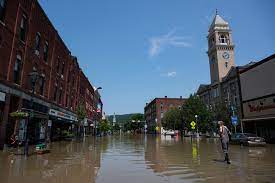Ranvir S. Nayar
The UN this week released a document, “General Comment No. 26,” which highlighted children’s rights and the environment, with a special focus on climate change. The document, which has been in the making for years, as is the norm at the UN, stated that the extent and magnitude of the triple crisis of climate emergency, the collapse of biodiversity and pervasive pollution is an urgent and systemic threat to children’s rights globally.
The observations were made by the Committee on the Rights of the Child, part of the UN Human Rights Commission, which emphasized the obligation of governments around the world to address environmental harm and climate change and added that children around the world have a fundamental right to a clean, healthy and sustainable environment. While GC26, as it is known, did not raise anything revolutionary or new, it did underline a very important principle and fact, which often gets lost in the cacophony surrounding climate change.
Numerous leaders, both political and business, from around the world, as well as activist organizations and institutions, have spoken about the need to hand down a sustainable, clean and healthy planet to future generations. Unfortunately, it is the norm that such statements, at least from people like political and business leaders, have turned out to be little more than yet more hot air to add to global warming. The vast gap between statements and actions and the all-round failure to meet numerous commitments, especially by the developed nations, which are essentially at the root cause of the climate emergency that we face today, mean that the planet being inhabitable and safe, not just for humans but all living beings, in the near future is now in doubt.
With its repeated missed targets on cutting carbon emissions and funding poor countries’ adaptation and mitigation of the impacts of climate change, the global community has put the world on a steep downhill slope toward climate catastrophe. This has put a very serious question mark over what the next generation will inherit, let alone the generations that may follow. With the world hurtling toward missing, by a huge margin, the targets for climate change and sustainable development set for 2030, the future appears to be getting bleaker by the day.
The share of children and youths in populations across the world is rising, driven largely by the growing populations in the developing world, notably South Asia and Africa, particularly sub-Saharan Africa. According to various estimates, the population of under-14s is set to rise from 1.98 billion in 2020 to 2.6 billion by 2050. And, if one considers the population of under-25s, then the number will be close to 3.5 billion. The global population is expected to peak at about 11 billion by the turn of the century, which means that Earth will be inhabited by many more people, with more than two-thirds or even 75 percent living in poor countries. This puts their fate under a cloud, as the current trends indicate that global temperatures are set to rise by 2.5 degrees Celsius above the pre-industrial era, even on a moderate assessment. The more severe projections, which seem to be far more realistic in the current situation, state that the temperature will be catastrophically 3.5 C higher.
This is certain to have cataclysmic impacts on everything on Earth, ranging from water, food and habitat to health, employment and the general well-being of humans. And the less said about the fate of other living beings, the better. Biodiversity, forests and oceans could all be decimated and the entire planet could become uninhabitable for all forms of life. This may seem like an extreme scenario, but there are enough indications and even evidence that the world is certainly headed that way unless global leaders – meaning the billionaire business leaders and the mighty political leaders of the rich world – need to wake up now or at least pretend that they are no longer asleep. It is no longer enough just to have more agreements, more declarations and more promises. The time for action – concerted, concentrated action – is here and now. It cannot wait a year or even a few months. The West needs to take its responsibilities seriously and start doing the things that are needed, such as making at least $1 trillion a year available for developing countries to allow them to take mitigation and adaptation measures. The West also needs to act today to cut its own emissions – and in dramatic fashion – so that it can compensate for its excesses of the past.
Both of these actions by the West are certainly going to be painful and will hurt their economies and people. But that is short-term pain; they will be able to overcome it in a few years. But if they fail to make these sacrifices, mainly to atone for their excesses of the past 150 years, they, along with the rest of the world, are set to pay a price that is far more painful and long-lasting. UN Secretary-General Antonio Guterres has already derided world leaders – i.e., the Western leaders – for lying about their commitments toward climate protection. Unfortunately, there is no more scope, space or time for lying. They will put the world, their own children and future generations at the most severe risk of decimation if they do not act now.







